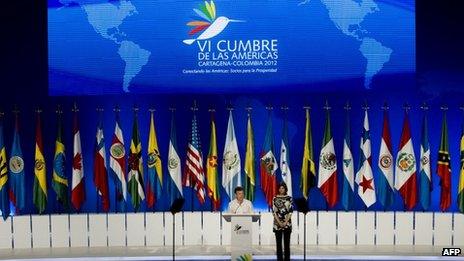Summit of the Americas ends without final declaration
- Published

President Santos said there was no room for the word 'failure'
A meeting of the heads of state and government of the Western Hemisphere has ended without a joint declaration.
The leaders failed to reach agreement on whether Cuba should attend the next gathering.
The US and Canada opposed demands by the Latin American nations to invite Cuba to the next Summit of the Americas to be held in Panama in 2015.
Cuba was excluded from participation in the Organization of American States, which runs the summits, 50 years ago.
The summit's host, Colombian President Juan Manuel Santos, denied the meeting had been a failure.
"Who thought that an agreement would be reached here about the Falklands and Cuba?" he asked, referring to the two subjects which had most divided opinion.
"We all knew there would be no agreements here, we knew it from before, so there are no negative surprises here," he told reporters at a news conference after the summit had ended.
Ecuador's President Rafael Correa had boycotted the summit in protest at the lack of an invitation for Cuba.
Many other Latin American and Caribbean nations had also expressed their unhappiness about Cuba's continued exclusion and, to avoid further cancellations, President Santos had promised to put the issue on the agenda.
But the United States and Canada stood firm in their opposition to Cuba's participation.
US President Barack Obama said that, unlike the other participants, Cuba "has not yet moved to democracy, has not yet observed basic human rights."
He said he was hopeful a transition would begin to take place inside the country.
"I and the American people will welcome the time when the Cuban people have the freedom to live their lives, choose their leaders, and fully participate in this global economy and international institutions," he said at a news conference after the summit.
But "we haven't gotten there yet", he said.
Early departure
Argentine President Cristina Fernandez left the summit before its official closing ceremony.
Diplomatic sources said she was frustrated that no agreement was reached to include a declaration of support for Argentina's claim to the Falkland Islands in the summit's final statement.
President Santos said she had bid him goodbye with the "usual friendship and affection".
But asked what Ms Fernandez had whispered to him after his opening speech, Mr Santos said: "You forgot to mention the Malvinas", in a reference to his omission of the subject in his remarks.
The Falklands, which Argentina calls the Malvinas, has been controlled by Britain since 1833 but Argentina claims the territory, saying it inherited rights to them from Spain.
Open debate
President Santos said the summit had succeeded in putting issues on the table which had never been discussed in such a forum before.
In particular, he welcomed the decision to give the Organization of American States (OAS) a mandate to analyse and discuss drug policies.
Mr Santos said the OAS would examine whether current policies were working, or if there were more effective and cheaper ways to fight the war on drugs.
He stressed that the debate was not about whether drugs should be legalised but about conducting an independent and unbiased study into the best way to counter illegal drug trafficking and organised crime.
Speaking ahead of the summit, US President Obama had expressed his administration's opposition to drug legalisation, but said he was open to a debate about the issue.
President Santos said the summit succeeded in laying open the topics which united, and divided, the countries of the Western Hemisphere.
"Unfortunately, these summits work on the basis of unanimity, if just one country says 'I don't agree', then there can't be a declaration," he said.
"But there is no room for the word 'failure'," he insisted.
- Published15 April 2012
- Published13 April 2012